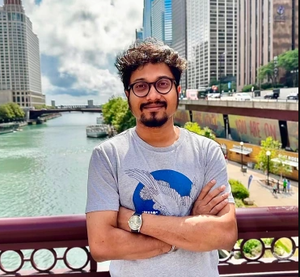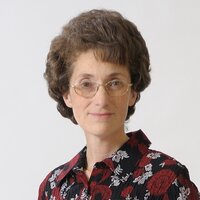Illinois chemistry alum Sohang Kundu (PhD, '23) did his PhD work in Prof. Nancy Makri’s research group, which develops theoretical methods based on the real-time path integral formulation of quantum dynamics to advance the understanding of quantum processes in large molecules and the condensed phase.
The American Physical Society (APS) has selected Kundu as the recipient of the 2024 Justin Jankunas Doctoral Dissertation Award in chemical physics for “illuminating work using real-time path integral methods to reveal the interplay of electronic and vibrational dynamics in excitation energy transfer.” His selection was announced March 5, 2024, following presentations by Kundu and other finalists at the APS March meeting.
Kundu's dissertation, "Exciton-vibration dynamics using real-time path integral methods," sheds light on the impact of coupling between electronic excitations and vibrational motions of nuclei on energy transfer between molecules in complex aggregates. Among many applications, Kundu, Makri, and their collaborators have shown that such couplings are directly responsible for the remarkable energy efficiency of bacterial light harvesting – the process by which complexes of pigment molecules in bacteria absorb solar radiation and transfer it to the photosynthetic reaction center. Their work was also the first to illustrate how quantum effects associated with the nuclear dynamics are crucial for attaining this efficiency.
Kundu said it feels great to be recognized with this award and to be re-assured that the work is important.
"One of the distant goals we mentioned in our papers was the design of energy-efficient materials to match nature’s efficiency in harnessing solar energy. We’re still quite far from that goal as a community and hopefully awards like this can attract more people to this work," Kundu said.
He said he owes a lot of this award to his PhD advisor chemistry Prof. Nancy Makri and what he learned from working with her. And he also mentioned the support he received from other chemistry professors.
"Most of my academic rigor, commitment to work, and respect for scientific integrity comes from Nancy. I am also grateful to Prof. Zan Luthey-Schulten who instilled a lot of confidence in me, in and outside of her classroom," said Kundu, who also mentioned Prof. So Hirata and Prof. Nick Jackson for encouragement and generosity with their time and chemistry department staff for their support as well.
Before his PhD work at Illinois, Kundu obtained a B.Sc. from Presidency University Kolkata (2015) and a master’s from the Indian Institute of Technology Bombay in 2017, and he is currently a Postdoctoral Research Scientist in Tim Berkelbach’s group at Columbia University. He said his ultimate goal is to become a tenure-track professor and lead a research group at an R-1 institution.
"In many ways, my current work is complementary to what I did for my PhD. I am still driven by the energy problem but lately I have become more curious about materials applications, particularly for energy storage. At Columbia, we are working with the Center for Computational Electrochemistry to understand and enhance the functioning of Lithium-ion batteries. I am also developing skills in ab initio electronic structure methods and in adapting machine learning algorithms for performing advanced simulations of materials," Kundu said.
Kundu said some of his most formative years as a researcher were at Illinois.
"Almost every skill I now use and try to improve upon as a scientist can be directly traced back to interactions with my PhD advisor, and to discussions with faculty and fellow graduate students at P-Chem seminars or lunch meetings with speakers. Despite being an international student very far from home, our department and campus at the U of I always felt like a warm place," he said.

